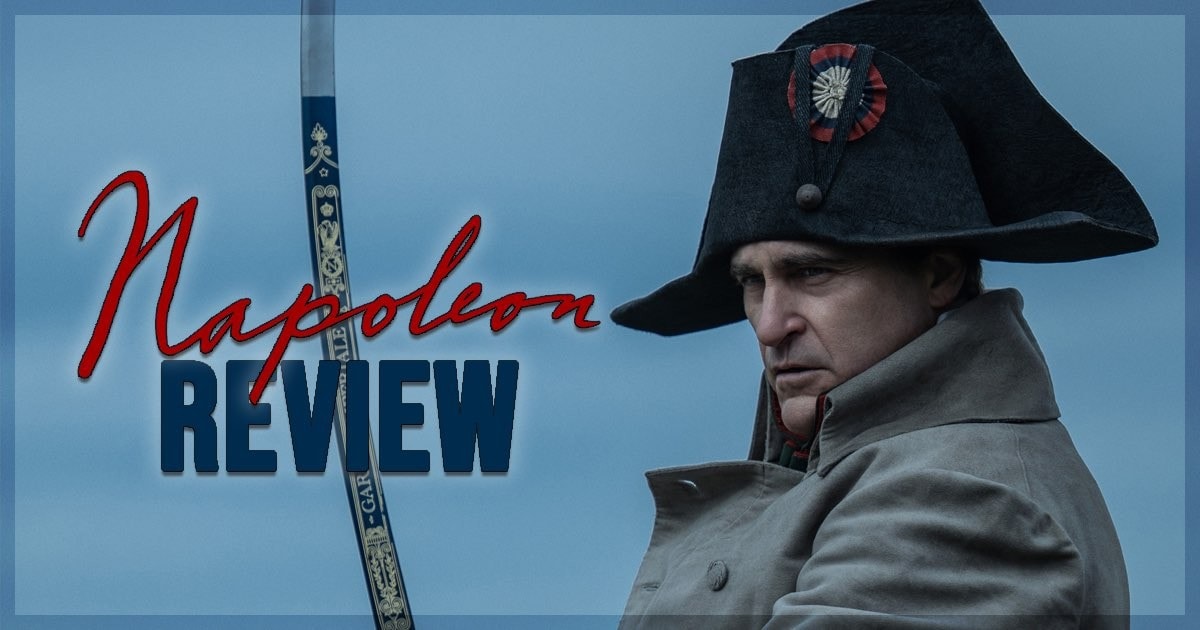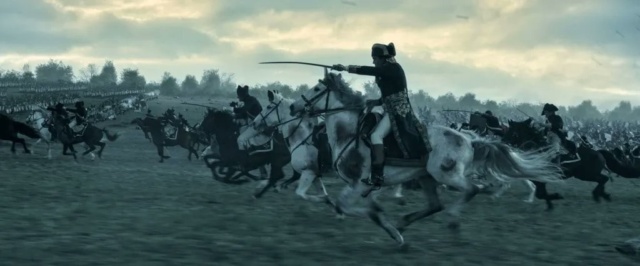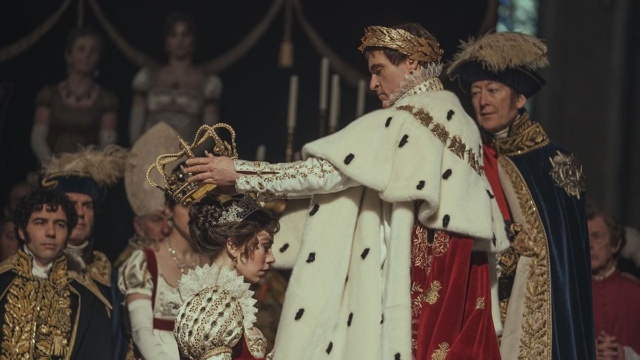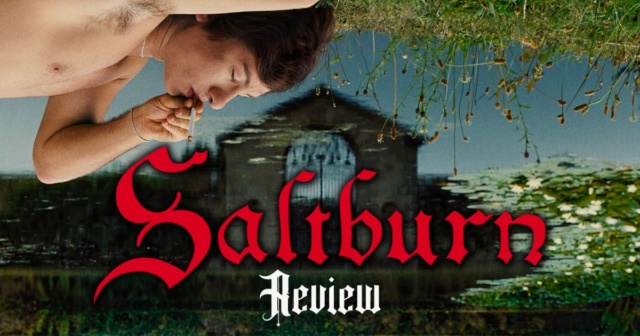Review: Ridley Scott’s Comedy-Epic Hybrid ‘Napoleon’ Is (Mostly) A Triumph

At age 85, Sir Ridley Scott is showing no signs of slowing down. The legendary, and often polarizing, auteur works more consistently than perhaps any modern filmmaker. His five decade-spanning career is hardly marked by safe projects, either. Scott’s the type of filmmaker to come out of the gate with paradigm shifts like Alien and Blade Runner, hit a new high near 30 years into his career with Gladiator, and then still release hits such as The Martian and hotly debated period pieces The Last Duel and House of Gucci. His latest picture, Napoleon, could very well be his most ambitious ever, taking aim at French Emperor, General, and all-around historical icon Napoleon Bonaparte.
To do so, Ridley Scott calls on all sorts of favors from his prior collaborators. Joaquin Phoenix, who portrayed the villain Commodus in Gladiator, steps into the leading role, while All the Money in the World and the upcoming Gladiator 2 writer David Scarpa pens the script. Cinematographer of his last eight films Dariusz Wolski lends his sharp eye whereas frequent editor Claire Simpson returns to keep the pace.
All of this talent stands behind Scott in service of a film that, yes, has aspirations to be a historical epic, but something quite different as well. Ridley Scott’s Napoleon marries the epic historical film to a bizarre comedy of his own creation, lampooning and honoring the titular figure in a simply delightful way, if a bit burdened by an overzealous edit.
The story in Napoleon: a tale of two approaches
If you have a cursory knowledge of history, you know who Napoleon Bonaparte is. The French army officer started his ascension in 1793, rising up the ranks until he became Emperor of France, his momentum only halted by his devastating loss at the Battle of Waterloo in 1815. David Scarpa’s script has no qualms with playing the hits, so to speak, presenting the major events of Napoleon’s career in highly bombastic fashion.
Nonetheless, if audiences crave an accurate historical biopic, they can look elsewhere. Scarpa and Scott choose to tell this story in a cinematic fashion rather than a didactic one, in many cases perpetuating myths of Napoleon’s life to enhance his grandeur, a key example being the Austerlitz ambush on the ice.

Napoleon leaves out most components of the historic figure’s life unrelated to his military career, except for one key facet: his romance with Joséphine (Vanessa Kirby). There’s push and pull between Napoleon and his beloved, a tumultuous affair where Joséphine must keep Napoleon’s childish inclinations at bay to shape him into something better as Napoleon struggles with his jealousy and overwhelming appetite for his betrothed. And it’s funny! Really, really funny! Behind the closed doors of their chambers, it almost reads like a sitcom in a costume drama’s clothing. Napoleon the hapless husband and Joséphine the cunning wife; a classic dynamic.
The two parts put together create a mixture that’s not revolting, nor will it be for everyone. To me, personally, I found the po-faced military drama being undercut by Napoleon’s constant ongoing relationship farce to be something of a hoot, and towards the end of the film it even becomes somewhat endearing.
Unfortunately, it feels like a lot of the connective tissue is missing to make the juxtaposition of these two elements play like they should. It’s very clear that a lot was cut out of the film, making getting from point A to point B suffer a lot more than a bit of tonal inconsistency as it feels like we’re speedrunning Napoleon’s exploits a bit at points. Thankfully, it helps knowing there’s a 4-hour director’s cut coming soon. Yet, that knowledge aside, Ridley Scott and David Scarpa’s vision for Napoleon still very much comes across thanks to its lead performances.
Joaquin Phoenix and Vanessa Kirby are caught in a bad romance
In a film of seasoned thespians, all of them fade into the background. This is Joaquin Phoenix and Vanessa Kirby’s show, and by God are they going to make the most of it. Phoenix’s Napoleon feels tailor-made to piss people off. On his good days, he’s a socially inept dork, sticking out as he stands like a statue at high society gatherings. At his worst, he’s a petulant child, frequently derailing meetings and embarrassing himself. It’s an unusual, though functionally strong, choice by Phoenix as it heightens a sort of transformation Napoleon undergoes when he arrives at the battlefield; his perpetual unease turns into steely-eyed determination, tactical genius even. In these moments, he becomes the icon.

As Napoleon so often claims, his great love is to all appearances France, but the real personal object of his heart is Joséphine. Vanessa Kirby plays Joséphine as the seductive master of Napoleon. She is the key to his resolve to snap into his “icon mode” while also cutting him very much down to size when he needs it. The two’s relationship, as portrayed in a delicate dance by Phoenix and Kirby, can be antagonistic, nurturing, one-sided, or fully reciprocated. Seeing how the dynamics evolve, from a sort of sado-masochism to an unbreakable bond, is nothing short of enchanting. Napoleon and Joséphine, whether bickering or sharing in admiration for one another, are the new great cinematic romance of the modern era, forged by the one-of-a-kind talents of Phoenix and Kirby.
Ridley Scott’s direction is one-of-a-kind
If you can expect one thing of Ridley Scott, it’s not to half-ass a production. Napoleon represents another positively mouth-watering picture from the filmmaker thanks to the all-hands-on-deck bravura of the crew. Costume designers Janty Yates and David Crossman, in conjunction with production designer Arthur Max, slavishly bring to life a France that feels like you’re stepping into another era. It’s on par with Gladiator– hell, it might best Gladiator when it comes to the combat sequences.
In the modern era, battle sequences like those featured in Napoleon simply do not exist. Painted in sweeping landscapes by Dariusz Wolski that give way to the intimate grit of scuffles among individual soldiers, there are no less than three perfectly realized battle sequences here that blur the line between great practical work and visual effects.
The opening fight against the French royalists kicks things off with a bang, while the mid-film battle of Austerlitz is an ice-set, cold-blooded show-stopper. And then you get to the Battle of Waterloo. A sequence with so many moving parts that dares to take its time, making sure the audience knows who the factions are, what’s at stake, the geography of the battlefield, and the ebbs and flows of who gains the upper hand. It’s invigorating, in an era where most films reduce their big battle scenes to explicit CGI gobbleygook, to get something this tangible.
I’m invigorated and inspired by the fact that a movie like Napoleon can exist in the modern era. Although hurt by its cut-down length, the blend of war epic and farcical romance, acted and directed masterfully, is the kind of full spectacle that we go to the movies for. It’s a film I’ve been thinking about for several days now, and probably will be for years to come. I have a sneaking suspicion that when that director’s cut arrives, it will go from a great film to a masterpiece.
★★★★/ ♥♥♥♥♥
Are you planning to check out Ridley Scott’s Napoleon while it’s in theaters? Are you interested in seeing the extended version on Apple TV? Let us know on social media @thecosmiccircus.com or in The Cosmic Circus Discord!
Review: Poor Things is a Bizarre Frankenstein Sex Comedy




